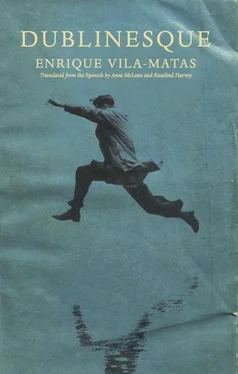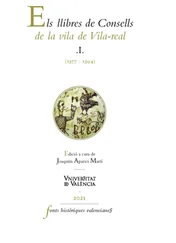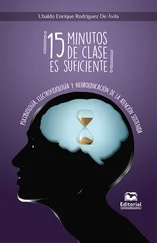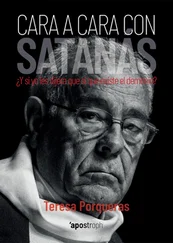He’d forgotten he was at his parents’ house. It feels like Wednesday of last week, when, head bowed, he said they are all gone, and his mother nodded in agreement. But this is another Wednesday.
It’s undoubtedly regrettable that, in the middle of a great muddle in his head, just as he was recalling how he thought that literature was Catherine Deneuve and afterward was never able to correct the misunderstanding, just as he was imagining her, alone and erotic, with her red shoes, naked underneath the trench coat, and with her cocked hat and her slight despair on a rainy day, his mother left him unable to complete this vision, which, once again, was getting him so excited. Because, in the end, when he met Celia, she too had looked to him like the spitting image of Deneuve in Cherbourg.
“It’s true, all I know is that it sometimes rains in Dublin,” he says, annoyed. “And then the city fills with trench coats.”
Has he been talking about raincoats? His mother reminds him that as a child he always loved them, was always waiting for it to rain so he could put one on. His mother wants to know if he really can’t remember this penchant of his. Well no, he doesn’t. But now that he thinks about it, it’s possible that this penchant for raincoats led to his fascination with Deneuve. No one knows about this great confusion of his between literature and Deneuve, not even Celia. It would be awful if someone found out, especially if the information fell into his enemies’ hands. They’d undoubtedly laugh at him. But what can he do if that’s how things are, and in reality it’s not so terrifying? Since time immemorial he’s associated Deneuve with literature itself. So what? Other people associate their lover with some rancid piece of chocolate cake they ate at the office. As long as it remains a secret, nothing will happen. Other people have more ridiculous secrets, and they certainly keep quiet about them. Although it’s also true that there are some people who don’t keep quiet, whose secrets aren’t ridiculous. Samuel Beckett, for example. One March night in Dublin, the Irish writer had a decisive vision, the sort of revelation that causes envy:
At the end of the jetty, in the howling wind, never to be forgotten, I saw the whole. The vision at last.
It was night time, and as he so often did, the young Beckett was wandering around on his own. He found himself at the end of a pier buffeted by a storm. And then it was as if everything found its place again: years of doubt, searching, questions, failures, suddenly made sense and the vision of what he had to carry out established itself like a piece of evidence. He saw that the darkness he’d always striven to reject was in reality his most precious ally, and he glimpsed the world he had to create in order to breathe. A kind of indestructible association with the light of consciousness took shape. An association of storm and night until the last breath.
As far as Riba remembered, this nocturne on the Dublin pier appeared later, a little altered, in Krapp’s Last Tape :
What will become of all this misery of ours? In the end, only an old whore walking around in an absurd raincoat, on a lonely dike in the rain.
In an essay — probably mistakenly, because he was often mistaken in his essays — Vilém Vok pointed out that this woman in the rain was the same one who appeared in Murphy and who was called Celia, the prostitute that the young writer-protagonist lived with, although she was much younger.
He’s always thought it quite a coincidence that this prostitute was called Celia, like his wife. Depending on how one looks at it, thanks to a simple rule of three, the old woman in the absurd raincoat from Krapp’s Last Tape could, due to her Deneuvesque trench coat, be literature and at the same time Celia from Murphy , very old by now, and also Celia, his wife, also very old.
All this leaves him quite confused, as if wandering around on a Dublin pier buffeted by a storm, wet with passion and from the waves. Until he remembers the raincoat, the mackintosh that appears in the sixth chapter of Ulysses . He remembers it’s a stranger attending the burial of Paddy Dignam who wears it. And it’s odd. Because nowadays, a Mac would just be a famous computer, but in those days it was a raincoat, a garment invented by Charles Macintosh, a name which somehow had a “k” added to it over the years when it came to refer to the coat.
He can’t help thinking that while he’s been a privileged witness to the leap from the Gutenberg to the digital age, he’s also observed the transition of the mackintosh coat to the Macintosh computer. Should he organize a requiem in Dublin for the age of this brand of raincoat? Immediately he congratulates himself on being able to cruelly satirize his projects, his efforts.
The stranger at Prospect Cemetery is someone we meet eleven times over the course of Joyce’s book, but who makes his first mysterious appearance in chapter six. Commentators on Ulysses have never been able to agree on his identity.
Now who is that lankylooking galoot over there in the macintosh? Now who is he I’d like to know? Now, I’d give a trifle to know who he is. Always someone turns up you never dreamt of [ Ulysses , chapter six].
“What are you thinking about?” interrupts his mother.
Once again, in his parents’ house, that feeling of forgetting where he is. He’s annoyed they’ve interrupted his journey through the Dublin cemetery. Of course, there isn’t much difference between the atmosphere of the Prospect Cemetery and that of his parents’ house.
“Dublin has dead people everywhere,” he answers angrily.
And it’s the beginning of the end. Of today’s visit at least.
“What?” his mother almost sobs.
“I said that death and children”—he’s growing more and more enraged — “look very similar over there. The gravediggers touch their caps after burying them. And some people still say ‘mackintosh’ when they’re talking about raincoats. It’s another world, Mama, another world.”
He hails a taxi. There are always lots on Calle Aribau. All you have to do is raise your hand and one stops automatically. Today he’s out of luck, inside the taxi it stinks. But it’s too late to change and the car is already on its way to his house. It’s also too late to put right the falling out with his parents. Maybe he shouldn’t stick to this unwavering commitment every Wednesday. Today, once more, the overwhelming impression of a wake and that intimate familiarity with ghosts have made him a nervous wreck. After his inappropriate remark, his apologies did no good.
“What was that shout?”
“I didn’t shout, Mama.”
He ended up slamming the door on his way out, and then feeling full of anguish and remorse. Now he’s trying to get away from his sense of unease and concentrate on this sixth chapter he wants to revive in Dublin, and which starts just after eleven o’clock in the morning, when Bloom gets on the tram at the baths on Leinster Street and goes to the dead man Paddy Dignam’s house, number 9 Newbridge Avenue, southeast of the Liffey, from where the funeral procession will leave. Instead of heading directly westward, toward the center of Dublin, and then northwest toward Prospect Cemetery, the cortège goes in the direction of Irishtown, turning northeast and then west. Obeying an old custom, they parade Dignam’s body first through Irishtown, toward Tritonville Road, north of Serpentine Avenue, and only after crossing Irishtown do they turn west down Ringsend Road and Brunswick Street, then afterward crossing the River Liffey and carrying on northwest toward Prospect Cemetery.
As the taxi drives down Calle Brusi, he sees a man walking fast. He reminds him of the young man who stormed out of La Central bookshop the other day. Riba looks away for a moment and when he looks back again, the stranger isn’t there anymore, he’s disappeared. Where can he have gone? Who was he?
Читать дальше












